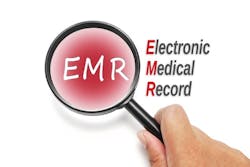Electronic health records (EHRs) were touted by the federal government as a solution to better patient care, but a lack of standards and regulation early in the implementation process resulted in not only fraudsters taking advantage of the system, but also resulted in patient harm.
The 2009 Health Information Technology for Economic and Clinical Health (HITECH) Act encouraged the use of EHR software through the distribution of billions of dollars in federal incentives. Physicians and other medical professionals would receive subsidies for adopting and using EHR systems. The goal was to get every doctor and all hospitals to use government-certified EHR systems that would result in more efficient, patient-centered service. However, the idea fell short in execution.
While almost all hospitals have adopted EHRs today, doctors frequently complain about the design and efficacy of EHR systems. The intent of the HITECH Act was to create a nationwide health record system with interoperability, but the rush to implement EHRs created several shortfalls in the original plan.
Instead of employing a universal EHR system, the federal government allowed competing vendors to design their own software as long as it is reviewed and certified by an Accredited Test and Certification Body (ONC-ATCB) to meet federal requirements.
To obtain government certification for their EHR systems, vendors must first demonstrate that their products meet all of the criteria set forth by the U.S. Department of Health and Human Services by passing an accredited test and obtaining certification from an accredited certification body. Many cases have been filed by whistleblowers under the False Claims Act alleging that EHR developers misrepresented the capabilities of their systems in order to pass the government certification test. Greenway Health LLC, an EHR developer, paid $57.25 million to resolve allegations that it falsely obtained certification of its EHR software among other issues.
Each EHR system has different user interfaces, different design flaws, and different levels of quality. Having a mix of different systems means they do not interoperate with each other as planned. This means if you have to go to the hospital to get a CT scan, the hospital cannot easily share the results with your primary doctor and will likely end up still having to send you home with a disc or other hard copy of your test results. A study published in Mayo Clinic Proceedings found that physicians gave the usability of EHR systems a grade of F.
While convenience and ease of use with EHR are one set of issues, another major issue is safety. An EHR safety project conducted by the Pew Charitable Trusts has found EHR software is failing at the most basic tasks, such as linking the correct medical record to the correct patient. Also, one in five patients is finding errors in their own medical records.
Additionally, from 2007 to 2018 there were 18,000 documented EHR-related safety events according to the healthcare analytics firm, Quantros. In about 3 percent of these cases patients were harmed because of the EHR and seven people died as a result of EHR systems.
While the government certification for EHR systems requires the software to have a medication ordering function, the systems differ across each platform. However, studies have found that many EHR systems failed to recognize potentially harmful or even fatal drug orders. Some doctors are filing lawsuits against vendors claiming their EHR software is defective and less efficient than the old paper systems they used before EHR.
EHR companies that fraudulently misrepresent the capabilities of their systems are putting the lives of patients at risk. Studies have found the number of EHR malpractice claims more than tripled from 2010 to 2018. Many of the claims were caused by electronic systems or technology failure. EHR developers that are more concerned with peddling high quantities of their products than designing quality products are endangering the lives of patients and wasting taxpayer dollars.
EHR systems are not only used to maintain patient records, but they are also used to track billing. In some cases, EHRs have made it easier for fraudsters to upcode or inflate medical bills. The U.S. Department of Justice is aggressively pursuing individuals, companies, and healthcare workers who participate in any type of EHR fraud.
Reporting EHR fraud
Individuals who report EHR fraud have specific legal rights and protections under the False Claims Act (FCA). The FCA provides protection to whistleblowers from retaliation, such as being fired or demoted. Federal FCA cases are filed under seal in a U.S. District Court. This means that while the Justice Department investigates the case is restricted to everyone else except the prosecutors and the judge.
Whistleblowers should consult an attorney to ensure protection. If you have evidence of that fraud is being committed against the government, your attorney can help you through the process and take your allegations to the federal government. If the case is successfully prosecuted, whistleblowers may be entitled to a monetary reward.
Professionals who work with EHRs should monitor their systems for flaws, errors and potential fraud. These professionals can help save taxpayer money, but more importantly, patient lives.
William G. Powers is an attorney with Baron & Budd’s Washington D.C. office, where he specializes in qui tam litigation.


